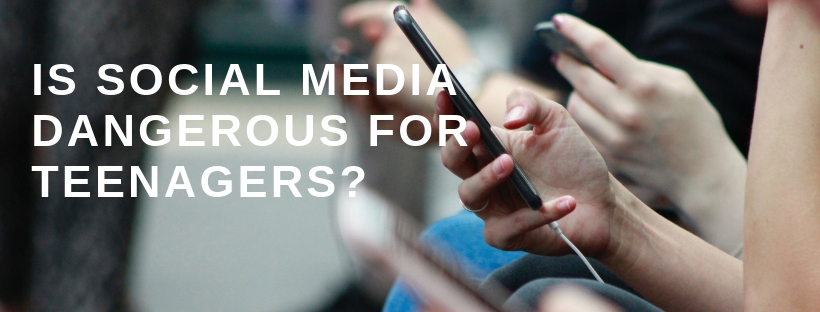With the rise of smartphones that are out there now and the advancement of technology, we are greeted with a plethora of apps to enhance the connectivity we have with one another. But with this rise of connectivity via a screen, in the long run, does it help or hurt the user? Recent data has surfaced that though we are more connected than ever before, we are actually more alone than ever before too.
My wife Alyssa and I do not have any teenagers yet but our daughter is approaching that age quickly. Today she even asked if she could create Youtube videos! I am excited about her creativity and ambition, but I am nervous too. What are the pros and cons of social media for a teenager? As a parent, we need to think about the use of social media and the effect it as on us before we are so quick to answer with a yes or no.
Pro #1- Connectivity
“The world is flat” as David Friedman declared in his book of the history of the 21st century. He was using this statement to show that we are more connected with the world than ever before. We can communicate instantaneously with others around the world. This is amazing instead of waiting for a letter which takes days, weeks, and even months; we wait seconds.
Teenagers today can communicate with family and friends who live in other states and even different countries. They can see pictures of those loved ones, comment on them, and share their own pictures with others.
Pro #2- Awareness
Not only can we connect with the world faster than ever we also receive news faster than ever before. The major news conglomerates now utilize social media as the main source of reporting news. The news is not only produced quickly but is rapidly being shared. We can know more of what is going on around the world than ever before, faster than ever before.
One can easily see a live car chase happening by just going on Facebook rather than turning on the T.V. and trying finding the right news channel covering it. We can hear the news to be more aware of what is going on and be more mindful of others because of this awareness.
Pro #3- God Glorifying
With all the technological advances that has happened throughout history such as the roads that Romans built, the printing press, and now the internet there is so much potential to share the Gospel with the world with whom we are connected with.
We can and should use technology for the sake of God’s glory. I have written in the past about how we can do this here. The believer uses the tools at his disposal to share the Gospel and point to God’s glory. A post can be used to share an encouraging Bible verse or share the Gospel.
These are a few of the pro’s but what about the con’s?
Con #1- False Reality
The danger with social media is the idea of what you see is the reality. The truth is most of social media is a partial reality or an enhanced reality. The user can manipulate what others see. I would suggest girls would struggle with this more than boys. The images that are being portrayed is not real but enhanced by filters.
When image is already a sensitive subject for teenagers, social media can pour gas on the fire of comparison. The danger of coveting comes into the heart. What you see is not what you get, but an enhanced version. One may be tempted to compare to that reality and then look at their own life in despair and discontentment.
Con #2- FOMO
FOMO (Fear of missing out) is a real thing that has been studied because of the rise of social media. I have written a little more extensively on FOMO.
Because of the connectivity and the awareness that social media offers there is also the fear of missing out on something. This can be when one was invited to something but unable to attend because of other obligations so they miss out. There is also the fear of missing out because one was just not invited. This is when you feel left out or not part of the group. You missed out!
There was still the fear of missing out before social media existed, it can not be used intentionally or unintentionally to celebrate what was one part of and bragged about what you missed out on. Social media has now magnified this as we can see the highlight reel of everyone’s life.
Con #3- Loneliness
Though we are more connected than ever before research has shown that we are also more lonely than ever before. Giles Slade shares in his book The Big Disconnect: The Story of Technology and Loneliness, that with the rise of different technological advances that make life easier, we have not moved away from personal connectivity. Talking in person is less and less while screen communication is expected more.
With the rise of social media there is an interesting link between the rise of depression among teenagers. Jean Twenge, author if iGen offers a correlation with the rise of social media there is a rise of depression and suicide. This rise has impacted boys but significantly girls. From 2011 is has grown rapidly where one out of every five girls reported symptoms of a major depressive episode.
Con #4- Danger
There is also the danger of pedophiles and cyberbullying. Teenagers who can be suspectible to these predators online. That is why it is important for parents need to be involved in their teenagers social media lives.
The rise of cyberbullying is a serious threat. The autonomy of being able to hide behind a screen and yet threaten someone without any regard is disturbing. These are realities that come with social media.
The Bigger Picture
Before we storm into the rooms of every teenager and delete their accounts it is important for parents to teach through this. There is a proper balance where we protect children from danger and malicious behavior but we also want to teach children how to handle these con’s to social media.
The best way to teach a teenager in response to all of this would be to remind them and show them that a believer’s identity is founded in Christ (Gal. 2:20; Eph. 2; 1 Peter 2:9). Remind them that a Christian’s worth and purpose is defined by Jesus and not by us or others. This reassures them that they do not need to compare nor worry about missing out. Yes, that happens but how do we respond when those moments occur? We run to the Lord!
A parent is a disciples their children. The best way to help our children who are growing up with screens as part of life is to teach them how to handle them safely, mindfully, and God glorifying. Again, be involved, have those conversations, have access to their accounts, be their friend on their account to monitor.


